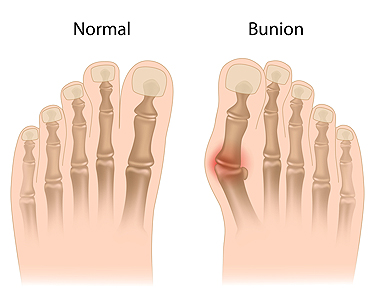Are Bunions Genetic?
Tuesday, 28 December 2021 00:00A bunion is a bony growth that occurs at the base of the big toe joint. Thought to be caused by faulty foot mechanics, bunions are often hereditary, meaning that they run in families. Wearing tight shoes with pointed toes can make bunions more likely to develop. Other than the deformity itself, symptoms of a bunion include pain, soreness, inflammation, redness, or a burning sensation around the bunion. It can become painful to wear certain shoes, walk, or stand for prolonged periods of time. Bunions progressively worsen without treatment, so it is strongly suggested that you see a podiatrist if you have a bunion that is bothering you.
If you are suffering from bunion pain, contact one of our podiatrists of Coastal Foot & Ankle Wellness Center, LLC. Our doctors can provide the care you need to keep you pain-free and on your feet.
What Is a Bunion?
Bunions are painful bony bumps that usually develop on the inside of the foot at the joint of the big toe. As the deformity increases over time, it may become painful to walk and wear shoes. Women are more likely to exacerbate existing bunions since they often wear tight, narrow shoes that shift their toes together. Bunion pain can be relieved by wearing wider shoes with enough room for the toes.
Causes
- Genetics – some people inherit feet that are more prone to bunion development
- Inflammatory Conditions - rheumatoid arthritis and polio may cause bunion development
Symptoms
- Redness and inflammation
- Pain and tenderness
- Callus or corns on the bump
- Restricted motion in the big toe
In order to diagnose your bunion, your podiatrist may ask about your medical history, symptoms, and general health. Your doctor might also order an x-ray to take a closer look at your feet. Nonsurgical treatment options include orthotics, padding, icing, changes in footwear, and medication. If nonsurgical treatments don’t alleviate your bunion pain, surgery may be necessary.
If you have any questions, please feel free to contact one of our offices located in St. Augustine, and Palatka, FL . We offer the newest diagnostic and treatment technologies for all your foot care needs.








